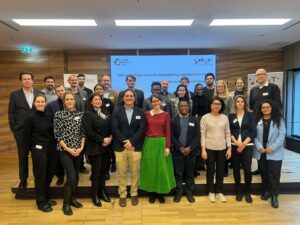How can we best protect democracy against the worldwide autocratization tendencies? And how can we improve mutual learning and exchange to this end, across different communities and perspectives?

These were the guiding questions of the expert exchange meeting “Democracy Protection in the Global North(s) and Global South(s): Strategies, Effectiveness, and Challenges” organized by the Polarisation and Democracy Team at IDOS on 28 November in Berlin. It brought together experts from different backgrounds, ranging from government and donor representatives to business associations, researchers and pro-democracy activists from Germany as well as the so-called Global South to discuss differences and similarities in the perceptions, challenges and approaches. In this line, it was a space across communities, which is crucial to identify synergies and advance our knowledge to how to protect democracy more effectively.
The discussion addressed strategies to protect democracy focusing on political parties and elections, democratic culture and civic education as well as the rule of law. It also included how best to address threats to the integrity of the information ecosystem and misinformation more specifically, discussing the proven value of media literacy campaigns as well as innovative solutions using AI tools.
Differences between contexts were discussed, and how different strategies are needed depending on whether democracy is challenged from the inside (ruling elite consolidating power using legal or violent means) or the outside (extremist groups or transnational influences). However, also similarities became apparent. A common theme perceived in many contexts was a frustration with the functioning of the democratic system that leads to a lack of trust in political institutions and creates a fertile ground for disinformation.
The discussion also highlighted the importance of renewing a shared understanding of what democracy means and what the consequences of (lack of) democracy are, building a shared democratic civil culture and cohesive society democracy can build on.

Schreibe einen Kommentar